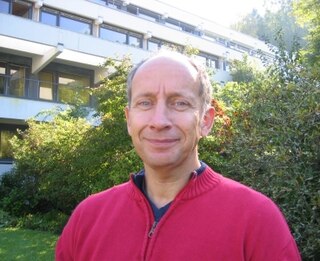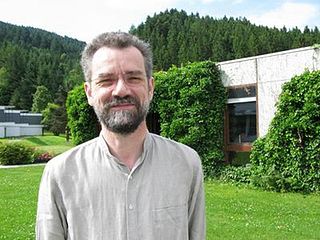In mathematics, a global field is one of two types of fields that are characterized using valuations. There are two kinds of global fields:
In number theory, Iwasawa theory is the study of objects of arithmetic interest over infinite towers of number fields. It began as a Galois module theory of ideal class groups, initiated by Kenkichi Iwasawa, as part of the theory of cyclotomic fields. In the early 1970s, Barry Mazur considered generalizations of Iwasawa theory to abelian varieties. More recently, Ralph Greenberg has proposed an Iwasawa theory for motives.
In mathematics, Dirichlet's unit theorem is a basic result in algebraic number theory due to Peter Gustav Lejeune Dirichlet. It determines the rank of the group of units in the ring OK of algebraic integers of a number field K. The regulator is a positive real number that determines how "dense" the units are.
In mathematics, Galois cohomology is the study of the group cohomology of Galois modules, that is, the application of homological algebra to modules for Galois groups. A Galois group G associated with a field extension L/K acts in a natural way on some abelian groups, for example those constructed directly from L, but also through other Galois representations that may be derived by more abstract means. Galois cohomology accounts for the way in which taking Galois-invariant elements fails to be an exact functor.
In mathematics, Artin–Schreier theory is a branch of Galois theory, specifically a positive characteristic analogue of Kummer theory, for Galois extensions of degree equal to the characteristic p. Artin and Schreier introduced Artin–Schreier theory for extensions of prime degree p, and Witt generalized it to extensions of prime power degree pn.
In mathematics, a field F is called quasi-algebraically closed if every non-constant homogeneous polynomial P over F has a non-trivial zero provided the number of its variables is more than its degree. The idea of quasi-algebraically closed fields was investigated by C. C. Tsen, a student of Emmy Noether, in a 1936 paper ; and later by Serge Lang in his 1951 Princeton University dissertation and in his 1952 paper. The idea itself is attributed to Lang's advisor Emil Artin.

In mathematics, the absolute Galois groupGK of a field K is the Galois group of Ksep over K, where Ksep is a separable closure of K. Alternatively it is the group of all automorphisms of the algebraic closure of K that fix K. The absolute Galois group is well-defined up to inner automorphism. It is a profinite group.
In mathematics, field arithmetic is a subject that studies the interrelations between arithmetic properties of a field and its absolute Galois group. It is an interdisciplinary subject as it uses tools from algebraic number theory, arithmetic geometry, algebraic geometry, model theory, the theory of finite groups and of profinite groups.

Jürgen Neukirch was a German mathematician known for his work on algebraic number theory.
In mathematics, especially in the areas of abstract algebra dealing with group cohomology or relative homological algebra, Shapiro's lemma, also known as the Eckmann–Shapiro lemma, relates extensions of modules over one ring to extensions over another, especially the group ring of a group and of a subgroup. It thus relates the group cohomology with respect to a group to the cohomology with respect to a subgroup. Shapiro's lemma is named after Arnold S. Shapiro, who proved it in 1961; however, Beno Eckmann had discovered it earlier, in 1953.
In algebraic number theory, Leopoldt's conjecture, introduced by H.-W. Leopoldt, states that the p-adic regulator of a number field does not vanish. The p-adic regulator is an analogue of the usual regulator defined using p-adic logarithms instead of the usual logarithms, introduced by H.-W. Leopoldt.
In number theory, more specifically in p-adic analysis, Krasner's lemma is a basic result relating the topology of a complete non-archimedean field to its algebraic extensions.

Wolfgang Lück is a German mathematician who is an internationally recognized expert in algebraic topology.
In mathematics, the inflation-restriction exact sequence is an exact sequence occurring in group cohomology and is a special case of the five-term exact sequence arising from the study of spectral sequences.
In mathematics, Tate duality or Poitou–Tate duality is a duality theorem for Galois cohomology groups of modules over the Galois group of an algebraic number field or local field, introduced by John Tate and Georges Poitou.
In algebraic topology, a transgression map is a way to transfer cohomology classes. It occurs, for example in the inflation-restriction exact sequence in group cohomology, and in integration in fibers. It also naturally arises in many spectral sequences; see spectral sequence#Edge maps and transgressions.
In mathematics, the Tsen rank of a field describes conditions under which a system of polynomial equations must have a solution in the field. The concept is named for C. C. Tsen, who introduced their study in 1936.

Uwe Jannsen is a German mathematician, specializing in algebra, algebraic number theory, and algebraic geometry.

Kay Wingberg is a German mathematician at the University of Heidelberg. His research interests include algebraic number theory, Iwasawa theory, arithmetic geometry and the structure of profinite groups.

Peter Bernd Schneider is a German mathematician, specializing in the p-adic aspects of algebraic number theory, arithmetic algebraic geometry, and representation theory.





